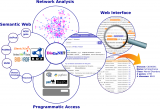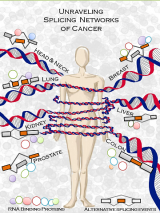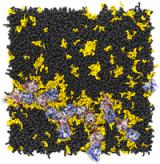26/05/2016
European project eTOX launches a new video
The video presents the 2nd hackathon event held at PRBB and gives an insight into the eTOX project.
The eTOX project aims to develop a drug safety database from the pharmaceutical industry legacy toxicology reports and public toxicology data, innovative in silico strategies and novel software tools to better predict the toxicological profiles of small molecules in early stages of the drug development pipeline. The eTOX project is funded by the IMI and coordinated by the GRIB (IMIM-UPF).

20/05/2016
Congratulations to Núria López-Bigas for the XI Banco Sabadell Foundation Award for Biomedical Research
The Jury of the Award for Biomedical Research of the Banco Sabadell Foundation decided to give this prize to Núria López-Bigas, leader of the Biomedical Genomics group of GRIB (UPF-IMIM), for her contribution to the development of new bioinformatics methods to study cancer genomes. Her work opens up new avenues for the classification of cancer patients according to their tumors carry mutations and thus advance the implementation of the most appropriate individualized for each patient therapies.
"This award helps to give visibility to the Biomedical Research and lets the society know the people who do research. It is a social recognition of the work we do and it is an honor for me that the research done in my group has been recognized" said Núria when knowing the news."In Barcelona, high quality biomedicine research is made with leading research groups in this field to develop high-impact projects for society. For me, it is a luxury to do research in this environment and appear next to the remains of scientists who have been honored with this award".

12/05/2016
Two doctoral students of GRIB awarded with the Doctoral School PhD Extraordinary Prize of the PhD Programme in Biomedicine of the UPF
Seven PhD Extraordinary Awards have been given of a total of 75 PhD theses defended in the academic year 2014-2015. Albert Antolín and Maria Martí have been awarded with this extraordinary Prize of the PhD Programme in Biomedicine.
The thesis of Albert Antolín, directed by Dr. Jordi Mestres, head of the Systems Pharmacology Group of GRIB, was entitled "The Impact of Polypharmacology on Chemical Biology" and focused on the selectivity of small molecules on their target proteins and its implications on pharmacological safety.
The thesis of Maria Martí, directed by Dr. Manuel Pastor and Dr. Jana Selent, head and PI respectively of the PharmacoInformatics group of GRIB, was entitled "Ligand selectivity at GPCRs: from multi-target binding profiles to biased agonism" and focused on the detection of molecules that enable the development of more efficient and secure antipsychotic drugs.
Albert Antolín is currently a Marie Curie Tecniospring postdoctoral fellow at the Hospital del Mar Medical Research Institute (IMIM) and María Martí is currently a postdoctoral fellow at the Institute of Pharmaceutical Chemistry of the Philipps University of Marburg, Germany. We congratulate both for this award!
The PhD Extraordinary Prizes will be officially presented at the UPF Graduation Ceremony for master's and doctoral degrees that will take place on July 1st, 2016, at the Ciutadella Campus.

4/5/2016
A new version of DisGeNET has been released!!!!
DisGeNET is a discovery platform integrating information on gene-disease associations from several public data sources and the literature. Developed by the Integrative Biomedical Informatics group of GRIB, DisGeNET integrates expert-curated databases with text-mined data, and it is one of the largest available repositories of its kind.
The new release of DisGeNET contains more than 400,000 gene-disease associations, comprising around 17,000 genes, and more than 15,000 diseases and phenotypes. Some of the new features of the current release include new expert-curated databases, information on more than 45,000 SNPs associated to diseases, new annotations of genes to phenotypes, the DisGeNET Gene-Disease association type ontology updated with new association types and new features to prioritize genes, and more...
For further details, visit the DisGeNET website and follow us at twitter @DisGeNET

29/04/2016
Project MedBioinformatics promotes the 1st European Conference on Translational Bioinformatics (ECTB 2016)
The conference took place at the University of Copenhagen on April 26-27, bringing together 150 experts in the area.
The conference addressed among others the following topics: Biomedical big data approaches, Data capture and curation, Precision medicine and Data integration and analytics combining omics and clinical data
ECTB is a new series of scientific conferences promoted by the MedBioinformatics project, which aims to have continuity by means of new editions to be held in UK (2017) and Barcelona (2018).
MedBioinformatics "Creating medically-driven integrative bioinformatics applications focused on oncology, CNS disorders and their comorbidities" is a project funded by H2020 and coordinated by the GRIB with the participation of other research groups of IMIM and UPF.
For more information about the conference please visit: http://www.translational.bi2016.eu/

28/04/2016
Scientists of GRIB find a new molecular mechanism involved in the development of cancer
Researchers of the Computational Genomics group of GRIB (UPF-IMIM) led by Eduardo Eyras, have discovered new alterations linked to cancer and have revealed the importance of the transcriptome in the development of tumours. For the first time, scientists have studied the variability of the cell transcriptome in several tumours at the same time, that is, not focusing on the DNA but on the products extracted from it. The results of the study have been published in the journal Genome Research.
Thanks to the bioinformatics tools developed by the research group, in record time and using limited computational resources, the scientists have been able to carry out a comprehensive analysis of the transcriptome of over 4,000 tumour samples from eleven different types of cancer taken from the TCGA project. This analysis shows that the proteins bound to the RNA are very often altered in human tumours and that these alterations determine the cell transcriptome and induce cell transformations related to the development of cancer. Until now, these alterations remained invisible to the methods used in major cancer genome analysis projects.
Reference work: Sebestyen E, Singh B, Miñana B, Pages A, Mateo F, Pujana MA, Valcarcel J, Eyras E. Large-scale analysis of genome and transcriptome alterations in multiple tumors unveils novel cancer-relevant splicing networks. Genome Research, 2016. DOI: 10.1101/ gr. 199935. 115

14/04/2016
Scientists of GRIB find the cause of the accumulation of genetic mutations in certain regions of the genome of melanomas and lung cancers
Genetic mutations are changes in the DNA sequence that can cause errors in cell function, and in the worst case, their accumulation leads to serious diseases such as cancer. To avoid this, cells have mechanisms that are continuously detecting and repairing these changes, but which sometimes fail, resulting in the accumulation of mutations and the emergence of tumours . A scientific team of the Biomedical Genomics group of GRIB, led by Núria López-Bigas, has found, for the first time, the reason why mutations specifically accumulate in certain regions of the genome in cells of melanoma and lung cancer (adenocarcinoma and lung squamous cell carcinomas), two which are highly prevalent in the population. The results of this research appear published in the latest edition of journal Nature.
Reference work: Radhakrishnan Sabarinathan, Loris Mularoni, Jordi Deu-Pons, Abel González-Pérez, Núria López-Bigas. Nucleotide excision repair is impaired by binding of transcription factors to DNA. Nature, April 2016. DOI: 10.1038/nature17661

12/04/2016
Thousands of genes from the umbilical cord change their activity in response to amniotic sac infection in preterm birth
A study published in the latest issue of Pediatric Research, the official journal of the American Pediatric Society (APS) and the European Society for Pediatric Research (ESPR), describes the largest molecular signature to date of the fetal inflammatory response (FIR), found in umbilical cord tissue from extremely preterm newborns. The research was conducted by Daniel Costa, paediatrician at the Hospital de Figueres (Figueres), and Robert Castelo, leader of the Functional Genomics group of the GRIB (IMIM-UPF).
According to the World Health Organization, one in every ten babies is born preterm. Thanks to the advances in perinatal medicine, extremely preterm babies increasingly survive premature birth. However, they often develop diseases of prematurity, such as perinatal brain damage amd more concretely, before birth about 30% of these newborns suffer an intra-amniotic infection that triggers an inflammatory response in the fetus, also known as the fetal inflammatory response (FIR), increasing their risk of disease and mortality.
In this study, Costa and Castelo conclude that Genes that increased their RNA molecular concentration are mainly involved in the activation of the innate and adaptive immune systems and constitute a valuable source of potential candidate FIR biomarkers . Genes that decreased their concentration, on the other hand, are mainly involved in fetal development, particularly brain development, and provide clues on possible molecular mechanisms leading to brain damage in FIR-affected preterm newborns

1/3/2016
Regulating neuronal membrane lipids could be the key to Alzheimer's and Parkinson's
The work has been carried out using latest-generation molecular simulations The results will, in the future, enable new therapeutic pathways
A study published in the prestigious journal Scientific Reports from the Nature group demonstrates, for the first time and using computational tools, that polyunsaturated lipids can alter the binding rate of two types of receivers involved in certain nervous system diseases. The work was led by the Miguel Servet researcher Jana Selent and Ramon Guixà, members of the PharmacoInformatics group of GRIB (IMIM-UPF).
Using latest-generation molecular simulations, which are like "computational microscopes", the researchers have demonstrated that a decrease in polyunsaturated lipids in neuronal membranes, as seen in Parkinson's and Alzheimer's sufferers, directly affects the binding rate of dopamine and adenosine receptors. These are part of the family of receptors connected to the G protein (GPCR), located in the cell membrane and responsible for transmitting signals to within the cell. Until now, various studies have demonstrated that lipid profiles in the brains of people with diseases like Alzheimer's and Parkinson's are very different from those of healthy people. These studies showed that the levels of a polyunsaturated fatty acid in neuronal membranes are considerably lower in the brains of sufferers. The researchers believe that this difference in the lipid composition of membranes could alter the way in which certain proteins interact with each other, as in the case of the GPCR receivers.

22/03/2016
Informative session of the Master in Bioinformatics for Health Sciences on April the 8th
Come to the information session of the master's degree in Bioinformatics for Health Sciences on April the 8th at 17:00.
The aim of this session is to provide information about the main characteristics of the Master, which is available for the 2016-2017 academic year. For further information and inscriptions click here (in Spanish) or here (in Catalan).
The Research Programme on Biomedical Informatics (GRIB) coordinates this Master.



